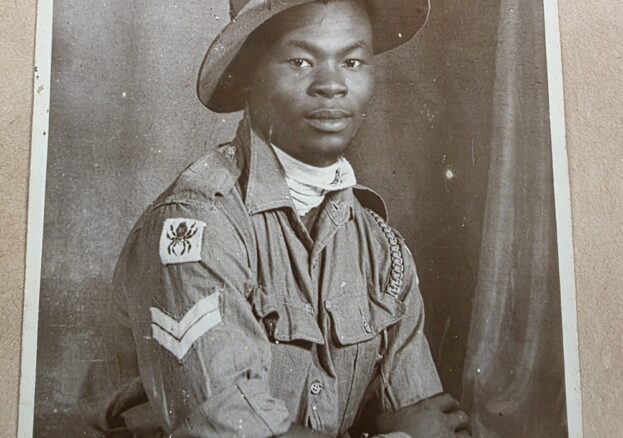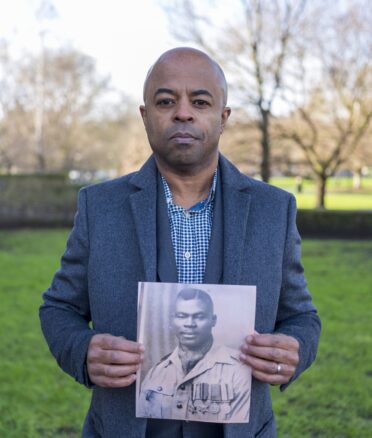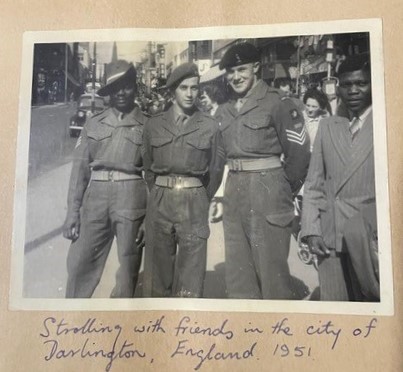
Michael’s story began in Togo in 1920, but he moved to Ghana when still a child to live with his uncle. As a 15-year old Boy Scout he was fascinated by the soldiers of the local barracks and would run errands for them. Mensah explains: “he had a number of tasks that they would set him each week and he would get a little bit of money off the back of that around the barracks: that’s where he felt most comfortable.”
“Coming from Togo, and being so different, he had to learn to handle himself because he stood out. I think that, and hanging around the barracks, really gave him a sense of self-worth.”
 It was little surprise that when Michael turned 18 he persuaded some of the officers to help him enlist and he trained as a signaller (despatch rider). Mensah reflects: “I think that was the first time he got that level of order. His life up until then had been kind of tempestuous”. And then war was declared.
It was little surprise that when Michael turned 18 he persuaded some of the officers to help him enlist and he trained as a signaller (despatch rider). Mensah reflects: “I think that was the first time he got that level of order. His life up until then had been kind of tempestuous”. And then war was declared.
Michael was one of the 600,000 men from Africa who served in British forces in WW2. When Britain declared war, the countries in the British Empire were also automatically at war. Says Mensah: “They had been told ‘the Germans are going to come over and destroy your way of life’ and they were told that conditions were going to improve for everybody, there would be a stipend, and everything would improve. And when they got back that wasn’t the case”.
In 1943, Michael was deployed to Burma (Myanmar) – one of 90,000 men from Africa who were part of the legendary 14th Army. On his uniform he proudly bore the Black Tarantula insignia of the 81st West African Division. He arrived in India in August, and the following year took part in the Arakan campaign, operating in the Kaladan Valley. A strong swimmer, Michael was chosen for reconnaissance missions along the Kaladan River.
Conditions were harsh and many of Michael’s comrades fell ill. The Japanese forces were determined to defend the territory they held at all cost. “He said that it was nothing like he had ever seen and that it was tough, really difficult,” recalls Mensah.
Michael was among the infantry of the 81st Division when they played a vital role in halting the Japanese advance in early 1945. They launched a joint attack with the 82nd (West Africa) Division to liberate the strategically-important town of Myohaung. .
 After more than a year on active service, the 81st Division was rested and prepared for the invasion of Malaya. They were in India when the Japanese surrender was announced in August and the war was finally over. The contribution of one million service personnel from the Commonwealth was crucial in the liberation of Burma and eventual victory.
After more than a year on active service, the 81st Division was rested and prepared for the invasion of Malaya. They were in India when the Japanese surrender was announced in August and the war was finally over. The contribution of one million service personnel from the Commonwealth was crucial in the liberation of Burma and eventual victory.
Mensah takes up Michael’s post-war story. “As soon as he came back he was de-mobbed, then eventually re-enlisted: it was in the blood. I think he went back with the Signals and then came to the UK to a couple of different training spots (including Catterick). In the Signal Squadron, Michael rose to the impressive rank of Regimental Sergeant Major. The camaraderie and experiences of Burma were deeply etched in his memory. This profound influence led him to build a house in Ghana’s capital, Accra, that became known as ‘The Barracks’, which contained tributes to his fellow soldiers. In recognition, the Accra authorities renamed the location of the house as ‘Arakan Square’.
One of the plaques on the house features Michael’s words: ‘It is courage and determination that wins a battle… Brace up, chest out, stride out briskly and close the gap’.
Michael was a keen, almost fanatical, sportsman and later promoted cycling nationwide. A relentless competitor, he took victory in the inaugural Coronation Race in Accra in 1953 and several national titles. He is fondly remembered as the father of Ghanaian cycling.
His retirement years were dedicated to supporting the Veterans Association of Ghana and the RBL poppy appeal. Mensah says that the family still fondly remember the booming sound of marching bands throughout the house, being played on the BBC World Service during Remembrance Day. “I know that was an annual event for him… it was ‘in stone’ that Remembrance events were important as he set up some of the associations in Ghana with a number of veterans”.
“He was front and centre of several Veterans Associations, so I can only imagine that is the space that he felt he could talk about those things.”
Michael passed in 2006, and Mensah reflects: “I’m very proud of what he did, I only wish that I knew more. I guess as those accounts weren’t seen as being worthy of recording earlier on, we have to now try and fill in a number of the gaps. When I think of his life and the thousands of African servicemen who were in the campaign, you just wonder what an incredible tapestry of stories we could have had, and that’s a real shame, but I’m grateful and I think he would be too, that there was still curiosity in ‘old mike’.”
